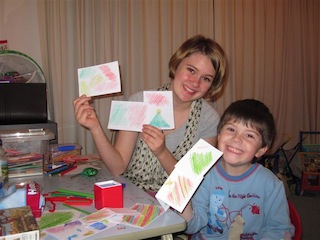
By seeing the same old things in new ways, you might discover a world of riches in the same old stuff you already had. Take, for instance, a deck of playing cards. What might seem too mundane and common to you isn't so common to someone else. And maybe your parents or grandparents thought cards were sinful, but playing dominoes or something else was okay. My dad's family was that way.
Playing card games has social benefits and leads to learning and all, but playing around with the cards themselves leads to dozens of things too! Compare aces and art from different decks. Consider the manufacture of cards, the traditional colors, the etiquette of card tables, shuffling, cutting, directions of play.
Cards connect to history, art, statistics, logic, geography, religion, law, entertainment, paper manufacturing, printing technology... well they don't connect to more things than everything else does, but they're an easy way to see how things connect!
Image from a Wikipedia article.
Other images and fun trivia are here:
History found in Playing Cards, on the Thinking Sticks blog


